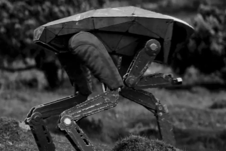I propose to consider the question, 'Can machines think?'
This should begin with definitions of the meaning of the terms 'machine' and 'think'.
The definitions might be framed so as to reflect so far as possible the normal use of words,
but this attitude is dangerous.
If the meaning of the words 'machine' and 'think' are to be found
by examining how they are commonly used
it is difficult to escape the conclusion that the meaning
and the answer to the question, 'Can machines think?'
is to be sought in a statistical survey such as a Gallup poll. But this is absurd.
- A. M. Turing's (1950, p. 433) 'Computing Machinery and Intelligence'
Approaches to AI Research |
|||||||||||||
|---|---|---|---|---|---|---|---|---|---|---|---|---|---|

|
|
||||||||||||

|
|
||||||||||||
Background image taken from: https://cdn.asiatatler.com/asiatatler/i/th/2020/02/04101225-aurora-1185464-1920_cover_1920x1280.jpg This website has been coded using html, css, and js and is dedicated to B and H .